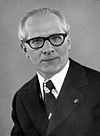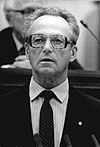Chairman of the State Council
| Chairman of the Council of State | |

|
|
| Standard of the Chairman of the State Council | |
| Official seat |
Schönhausen Palace (until 1964) and State Council building in Berlin |
| Term of office | 4 years or 5 years (from 1974) (re-election possible) |
| Existence of the office | 1960 to 1990 |
| Deputy | Deputy Chairman of the State Council |
| Predecessor | President of the Republic |
The office of Chairman of the Council of State or Chairman of the Council of State of the German Democratic Republic was created in 1960 in place of the previous office of President of the GDR , which had been held by Wilhelm Pieck from 1949 until then . Under constitutional law, the State Council of the GDR was considered to be the collective head of state , but in practice the Chairman of the State Council was regarded as the de facto head of state.
According to Article 67 of the Constitution of the GDR , the chairman, the deputy chairman, the members and the secretary of the Council of State were elected by the People's Chamber at its first session after the new election for four years (since 1974 for five years).
The heads of state council of the GDR were:
| Surname | Taking office | Resignation | Political party | image |
|---|---|---|---|---|
| Walter Ulbricht | September 12, 1960 | 1st August 1973 | SED |

|
| Willi Stoph | 3rd October 1973 | October 29, 1976 | SED |

|
| Erich Honecker | October 29, 1976 | October 24, 1989 | SED |

|
| Egon Krenz | October 24, 1989 | December 6, 1989 | SED |

|
| Manfred Gerlach | December 6, 1989 | April 5th 1990 | LDPD |

|
After the first free elections to the People's Chamber in 1990 took over through a constitutional amendment , the newly elected President of the People's Chamber , Sabine Bergmann-Pohl , the functions and powers of the Council of State until the election of a new president of the GDR. This new election did not take place because the GDR dissolved on October 3, 1990 as a result of German reunification .
Presidents of State Councils in other countries
Likewise in Poland with the constitution of July 22, 1952 according to Article 24 a collective head of state with the name " Rada Państwa " (German Council of State ) was created, whose chairman is called "Przewodniczący Rady Państwa", thus in the German translation the same as the corresponding one Office in the GDR Chairman of the Council of State , was designated. The chairman, four deputies to the chairman, the secretary and nine other members of the State Council were elected by the Sejm for a four-year term , analogous to the regulations in the GDR . The position of the chairman of the state council in public was weaker than in the GDR, since until 1985 there was no personal unity between the party leader, who actually had power, and the chairman of the state council.
Other socialist states, such as Yugoslavia (there “State Presidency”), also had collective heads of state, some with rotating presidencies.
